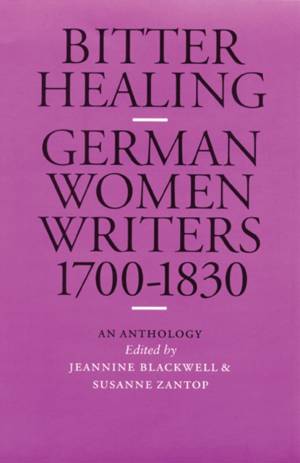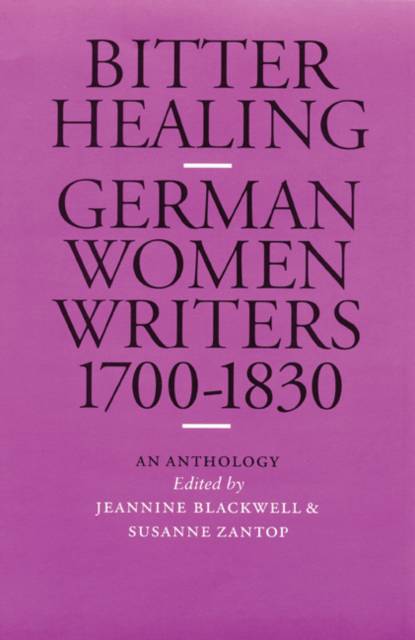
- Retrait gratuit dans votre magasin Club
- 7.000.000 titres dans notre catalogue
- Payer en toute sécurité
- Toujours un magasin près de chez vous
- Retrait gratuit dans votre magasin Club
- 7.000.000 titres dans notre catalogue
- Payer en toute sécurité
- Toujours un magasin près de chez vous
Bitter Healing
German Women Writers, 1700-1830. an Anthology
39,45 €
+ 78 points
Description
Bitter Healing is the first anthology of eighteenth- and early-nineteenth-century German women's writing in English translation. It goes far toward filling a major gap in literary history by recovering for a wide audience the works of women who were as famous during their lifetime as Wieland, Schiller, and Goethe. Like those men, they wrote in the early modern period spanning the transition from early Enlightenment to Romanticism. Edited by Jeannine Blackwell and Susanne Zantop, this collection assembles little-known writings by fifteen authors from various social classes, religious backgrounds, and political persuasions. They include the forgotten pietist theologian Johanna Eleonore Petersen, the radical social reformer Bettina von Arnim, the outspoken peasant's daughter Anna Luisa Karsch, the aristocrats Annette von Droste-Hülshoff and Karoline von Günderrode, and the conservative monarchist Sophie von La Roche, among others. Their autobriographies and letters, "moral" and not so moral tales, lyrical and protest poems, plays, and fairy tales deal with religious crisis, family conflict, and harmony, mothers and daughters, wise women, romance and pain and the healing power of love, self-understanding, escape, and the magical and humorous. The variety and quality of the pieces testify to the creativity of women writers during this first peak of literary activity in Germany, the so-called Age of Goethe. The editors have provided a short biography and bibliography for each writer. Jeannine Blackwell, an associate professor of German at the University of Kentucky, has published articles in Germanic Review and other scholarly journals. Susanne Zantop, whose introduction to this book traces German women's social and literary history from the Middle Ages to 1800, is an assistant professor of German and comparative literature at Dartmouth College and the editor of Paintings on the Move: Heinrich Heine and the Visual Arts (University of Nebraska Press, 1989).
Spécifications
Parties prenantes
- Editeur:
Contenu
- Nombre de pages :
- 539
- Langue:
- Anglais
- Collection :
Caractéristiques
- EAN:
- 9780803299092
- Date de parution :
- 01-09-90
- Format:
- Livre broché
- Format numérique:
- Trade paperback (VS)
- Dimensions :
- 152 mm x 229 mm
- Poids :
- 725 g






